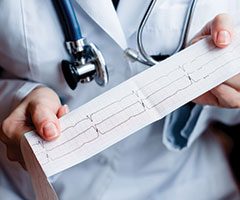Implantable Defibrillator (ICD)
What are implantable cardioverter defibrillators (ICD)?
Some people are in danger of developing a dangerously fast or irregular heart rhythm that can lead to death within minutes.
An implantable cardioverter defibrillator, or ICD, is implanted in the chest to detect and stop dangerous heart rhythms that cause sudden cardiac death.
If the heart begins beating dangerously fast or its contractions become disorganized, the ICD delivers an electrical shock to jolt the heart back to a normal rhythm. ICDs have saved many people from sudden cardiac death.
ICDs are implanted in patients who are at high risk of developing dangerous rhythms in the pumping chambers of the heart. You may be a candidate for ICD implantation if you are at high risk for these abnormal rhythms because of damage to your heart (such as from a previous heart attack or heart failure), or if you have already experienced dangerous heart rhythms.
-
Cardiac Device Clinic
At the Cardiac Device Clinic, we have a dedicated team of highly specialized staff experts in managing implanted cardiac devices, including pacemakers, implantable cardioverter-defibrillators (ICDs), and implantable loop recorders.
How are implantable defibrillators implanted?
An electrophysiologist, a cardiologist who specializes in heart rhythm problems, will surgically implant the ICD.
We give you medication through an IV to help you relax, but you remain awake during the procedure. You are also given an anesthetic to numb the skin at the site of the incision. Your heart rate and blood pressure are monitored throughout the procedure.
An incision is made just under your left collarbone. The leads (wires) from the ICD are directed down veins until they make contact with your heart. The generator of the ICD is then placed beneath your skin.
The surgery to place an ICD typically takes from 2-4 hours.
If the ICD detects an abnormal heart rhythm, the generator will provide an electrical shock that travels down the leads and to your heart. This shock will restore your heart to its regular rhythm.
Is getting an implantable defibrillator risky?
Complications from the placement of an ICD are rare. They include the following:
- Infection
- Reaction to the medication
- Bleeding or bruising
- Swelling
- Damage to veins
- Bleeding around the heart
- Blood leaking in the heart at the site of the leads
-
Cardiology - Heart Institute at Bass Road
-
Cardiology - Heart Institute at Cape Coral Hospital
-
Cardiology - Heart Institute at Coconut Point
-
Cardiology - Heart Institute at Medical Plaza One
-
Cardiology - Heart Institute at Metro Parkway
-
Cardiology - Heart Institute at Sanctuary
Technology and Expertise at Lee Health
Lee Health offers the most advanced and effective heart rhythm treatments to our patients. We have two fully equipped electrophysiology labs and one dedicated implant room. They are staffed by nurses and technicians who work exclusively on heart rhythm disorders.
The Cardiac Device Specialists are an important part of your care team and will be responsible for evaluating your implanted device at regular intervals and providing valuable information to your Cardiologist. We follow recommended guidelines by testing and evaluating your ICD function every 3 months either in the office or by remote transmissions from a home monitor.
We can also remotely monitor your ICD daily (Monday-Friday) so your Cardiologist can address any device or arrhythmia concerns between your routine device checks. *Remote monitoring is a diagnostic tool only and should never be used in emergencies. If you are experiencing a medical emergency, call 911 immediately





















































































